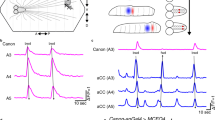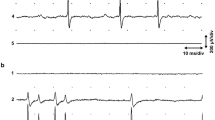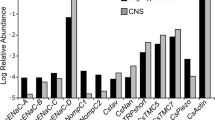Abstract
A VARIETY of electrical events can be demonstrated in the nerve cord and myotomes of amphioxus by conventional electrophysiological methods, following electrical, mechanical or photic stimulation. Fine silver wire electrodes (20–30µ) or tungsten micro-electrodes (2.0–0.5µ) proved more satisfactory than glass capillaries. Recordings were made from the intact animal, from preparations stripped off muscles and from isolated nerve cords. Further details of the experimental procedure will be published elsewhere.
This is a preview of subscription content, access via your institution
Access options
Subscribe to this journal
Receive 51 print issues and online access
$199.00 per year
only $3.90 per issue
Buy this article
- Purchase on Springer Link
- Instant access to full article PDF
Prices may be subject to local taxes which are calculated during checkout
Similar content being viewed by others
References
Bone, Q., J. Comp. Neurol., 115, 27 (1960).
Flood, P., J. Comp. Neurol., 126, 181 (1966).
Author information
Authors and Affiliations
Rights and permissions
About this article
Cite this article
GUTHRIE, D. Control of Muscular Contractions by Spinal Neurones in Amphioxus (Branchiostoma lanceolatum). Nature 216, 1224–1225 (1967). https://doi.org/10.1038/2161224a0
Received:
Published:
Issue Date:
DOI: https://doi.org/10.1038/2161224a0
This article is cited by
-
Vergleichende histophysiologische Tracer-Untersuchungen an verschiedenen Organsystemen von Branchiostoma lanceolatum (Cephalochordata) und Brachydanio rerio (Teleostei)
Zeitschrift f�r Zellforschung und Mikroskopische Anatomie (1973)
Comments
By submitting a comment you agree to abide by our Terms and Community Guidelines. If you find something abusive or that does not comply with our terms or guidelines please flag it as inappropriate.



